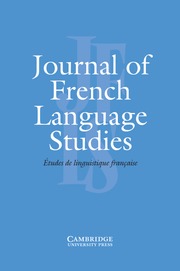Article contents
Progress in learning French vocabulary in a one-year advanced course at school1
Published online by Cambridge University Press: 01 November 2008
Abstract
This article reports on vocabulary learning in French during Year 12 by 150 pupils in 15 English comprehensive schools. Vocabulary progress over two school terms was investigated in the context of learner strategy training that targeted listening and writing. This intervention was carried out in eleven schools and results compared with a comparison group of four schools. Recognition vocabulary and writing vocabulary measures taken during the students' course are compared with listening and writing scores, and examination results. Results suggest that interventions which target listening and writing skills do not lead to significant gains in vocabulary through incidental learning and the deployment of vocabulary in writing tasks. However, it also appears that extra time and effort devoted to developing listening and writing is not at the expense of vocabulary learning.
- Type
- Articles
- Information
- Journal of French Language Studies , Volume 18 , Special Issue 3: Knowledge and use of the lexicon in French as a second language , November 2008 , pp. 349 - 364
- Copyright
- Copyright © Cambridge University Press 2008
Footnotes
This research forms part of the project ‘Strategy training in Year 12 French’ funded by the Economic and Social Research Council (Grant no. RES-000-23-0324) and conducted by Ernesto Macaro, Bob Vanderplank (Oxford University) and Suzanne Graham, Brian Richards and Kristyan Spelman-Miller (Reading University). Special thanks go to Lynn Erler, Shirley Lawes and Denise Santos for their help with data collection and analysis. We would also like to thank Jim Milton for his suggestions following an earlier oral presentation of these data and three reviewers for their helpful comments.
References
REFERENCES
- 5
- Cited by


